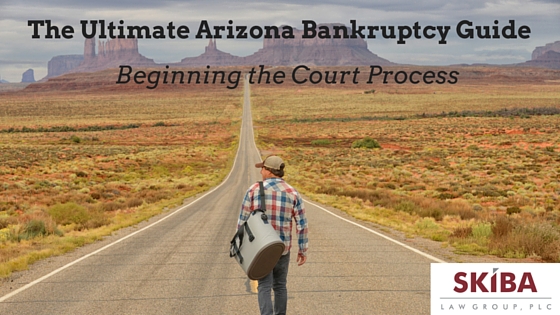In most consumer bankruptcy cases most of the heavy lifting when it comes to the work involved is done prior to the actual filing of your bankruptcy documents with the bankruptcy court. Now that everything is ready to it is time to plan out when you are going to file your case.
This may seem like a no-brainer but deciding what day to file your case can have a significant impact on bankruptcy case. Here are a few considerations you must take in deciding when to file your case:
Bank Account Balance
In Arizona the laws the protect your assets (called exemption laws) allow you to have no more than $300 across all of your bank accounts ($600 for couples). This limitation only applies to the exact day that you file your bankruptcy case. But if you happen to have more than $300 across all of your checking/saving accounts then the bankruptcy trustee assigned to your case will ask you to turn over all funds above $300 ($600 for couples).
For example, let’s say that you are married and on the day you file for bankruptcy you have $1,500 in your checking account. The exemption in Arizona for a bank account is $600, so you have $900 too much. This $900 is considered “non-exempt” and the bankruptcy trustee assigned to your case will have you turn over the $900 for distribution to your creditors.
Because of this it is important to plan your bankruptcy filing on a day when you will have low balances in your bank accounts. This means that you likely don’t want to file your bankruptcy on pay day or at anytime when you have a large balance.
In many instances I will work with clients to plan out filing on the day before pay day when bank accounts are often at their lowest.
One word of caution, if you do have more than $300/$600 in your account you can’t simply withdraw the money, file your bankruptcy, and then re-deposit it later on. The money must be actually used, spent, etc. If you still have the money on hand you will still lose it.
This is a quirk in Arizona exemption law and takes a little planning but in most cases it is not a big issue.
Credit Card Purchases and Cash Advances
Another thing that can impact the timing of when you file your case is if you have purchased luxury items on your credit card in the  last ninety (90) days or if you have taken out a cash advance off of your credit card within the last seventy (70) days.
last ninety (90) days or if you have taken out a cash advance off of your credit card within the last seventy (70) days.
The Bankruptcy Code states that charges on a credit card for luxury items purchased within the ninety (90) days prior to filing are presumed to be non-dischargeable. This means that there is a presumption that these specific charges don’t go away in your bankruptcy. Same goes for cash advances on a credit card within the last seventy (70) days.
It is important to understand a couple of things here. First, the Bankruptcy Code does not define what a “luxury item” is. Safe to say if you buy jewelry, take a cruise, or buy some other non-essential expensive item on a credit card it could be considered a “luxury item” while buying things like gas, groceries, diapers, etc. would not be considered a luxury purchase.
Second, while there is a presumption that a specific credit card charge won’t be discharged it will only survive your bankruptcy case i the credit card company comes into your bankruptcy and files legal briefs alleging that those specific charges should not be discharged.
If they don’t make an appearance and obtain an order from the bankruptcy court then even those charges will be eliminated in your bankruptcy discharge.
To be safe, if you know you are needing to file for bankruptcy in the near future stop using your credit cards. If there have been significant credit card usage you will want to consult with your bankruptcy lawyer and possibly push off your bankruptcy filing until you are outside the seventy (70) and ninety (90) look-back periods.
Preferential Payments to Family Members or Friends
A third consideration that may impact the day on which you choose to file your bankruptcy case is whether you owe money to a family member or friend and have been making payments to that family member or friend.
The Bankruptcy Code states that any payments made to an “insider” to repay a debt in the one (1) year prior to your bankruptcy filing can be voided and the bankruptcy trustee can contact your family member or friend and demand that they give the money back so that it can be distributed equally among all of your creditors.
For this reason if you currently owe a family member money it is best to not pay them at this point. You can voluntarily repay anyone you want after the bankruptcy case is over, but for now it is best for the family member to wait.
How the Bankruptcy Case is Filed
 Once a the case is ready to go and you have selected an appropriate day to file your case the actual filing of the case can seem pretty anti-climatic. The Arizona bankruptcy court requires that bankruptcy attorneys file their cases via the court’s electronic filing system.
Once a the case is ready to go and you have selected an appropriate day to file your case the actual filing of the case can seem pretty anti-climatic. The Arizona bankruptcy court requires that bankruptcy attorneys file their cases via the court’s electronic filing system.
With the help of software specially made for bankruptcy lawyers can literally file a case with the click of a mouse.
Next Up…The Consumer’s Hammer
 Immediately after your bankruptcy case is filed the bankruptcy court will issue one of the most powerful tools in the bankruptcy process…the Automatic Stay.
Immediately after your bankruptcy case is filed the bankruptcy court will issue one of the most powerful tools in the bankruptcy process…the Automatic Stay.
In the next installment of The Ultimate Arizona Bankruptcy Guide I will discuss what the Automatic Stay is and how you can use it to finally find financial peace.
Schedule a Free Consultation!
 John Skiba, Esq.
John Skiba, Esq.
We offer a free consultation to discuss your debt problem and help you put together a game plan to eliminate your debt once and for all. Give us a call at (480) 420-4028

